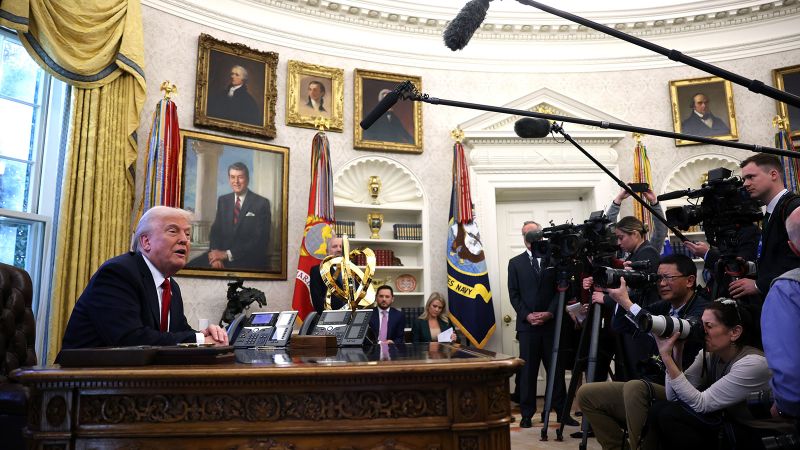
5 things to know for March 27: Yemen group chat, Health care funding, Auto tariffs, Social Security, Tufts student detained
CNN
CNN’s 5 Things AM brings you the news you need to know every morning.
Gun control groups earned a rare victory at the Supreme Court yesterday when the justices upheld Biden-era federal regulations on “ghost guns.” The court ruled that manufacturers must include serial numbers on the mail-order kits — which allow people to build untraceable weapons at home — and perform background checks on purchasers. Here’s what else you need to know to Get Up to Speed and On with Your Day. The Atlantic published additional text messages on Wednesday that top Trump officials inadvertently shared with a reporter in a Signal group chat about a US military attack on Houthis in Yemen. The release of such sensitive information, which several members of the administration have claimed was not classified, underscored the extent of the breach in operational security. President Donald Trump and his aides have responded to the national security scandal by downplaying its severity, insulting the magazine and its editor-in-chief and calling it a “witch hunt.” And the likelihood of accountability is slim. Trump has already fired inspectors general from more than a dozen federal agencies and installed loyalists in the Department of Justice and the FBI. Republicans in Congress have also been loathe to serve as a check on the actions of the executive branch. The Trump administration has decided to pull back more than $11 billion in grants that were allocated to state and community health departments during the Covid-19 pandemic. Although the funds were originally used for Covid testing and vaccinations, states have since budgeted the money for projects that would help health care systems prepare for the next emergency, such as outbreaks of measles or bird flu. In a statement, the Department of Health and Human Services said it was taking the money back because the pandemic is over and now it wants to focus on President Trump’s mandate to “address our chronic disease epidemic and Make America Healthy Again.” Brian Castrucci, president and CEO of the de Beaumont Foundation, a nonprofit that studies and supports the US public health workforce, described the decision to pull the funding as “a devastating blow to public health.” In a major trade war escalation, President Trump on Wednesday announced 25% tariffs on all cars shipped to the US and on foreign-made car parts. In response to the announcement, General Motors’ stock price plunged more than 7% in after-hours trading. Shares of Ford and Stellantis also dropped by more than 4%. European Commission President Ursula von der Leyen condemned the tariffs and Canadian Prime Minister Mark Carney called them a “direct attack” and a violation of the United States-Mexico-Canada Agreement. Even if other countries decide not to retaliate with their own tariffs on US goods, car companies are likely to pass on the added costs from the tariffs to American consumers. The Social Security Administration has decided to backtrack on its plan to require all applicants filing for benefits to complete their claims in person or online. Now, only people applying for retirement, survivors or family benefits will have to do so after April 14. Those applying for disability benefits, Supplemental Security Income and Medicare will continue to have the option of filing claims by phone. At a time when the SSA is planning to eliminate 7,000 jobs — or about 12% of its staff — and close some local offices, this new policy could force people to travel long distances and wait longer for service or payments.

‘Farewell, junk food!’: Mexico bans sale of salty and sweet treats in schools to fight child obesity
A government-sponsored junk food ban in schools across Mexico took effect on Saturday, officials said, as the country tries to tackle one of the world’s worst obesity and diabetes epidemics.

Campaign spending has smashed records in Wisconsin’s high-stakes Supreme Court race, as megadonors from both parties are directing millions to the closely watched election that’s set to decide ideological control of the battleground state’s high court. And tech billionaire Elon Musk is flexing his growing political influence after his key supporting role in President Donald Trump’s 2024 campaign.

 Run 3 Space | Play Space Running Game
Run 3 Space | Play Space Running Game Traffic Jam 3D | Online Racing Game
Traffic Jam 3D | Online Racing Game Duck Hunt | Play Old Classic Game
Duck Hunt | Play Old Classic Game









